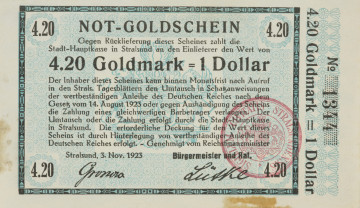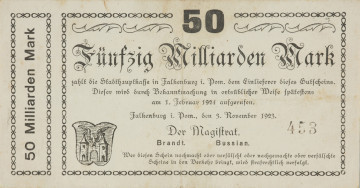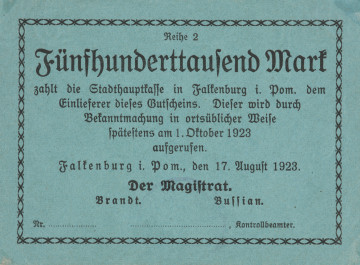
4.20 golden mark= 1 dollar
1923
National Museum in Szczecin
Part of the collection: Paper money
During World War I, Germany ran out of pfennig and mark coins in circulation, and minting replacement coins in private companies became very expensive and time-consuming. At that time, a decision was made to use paper to produce petty substitute money. In the following years, it was the basic raw material for the production of all substitute cash. The decision to print Lębork’s substitute cash was made on 15 November 1918, a couple of days after wartime hostilities ended. The new notes had three values – 5, 10 and 20 marks. Printing substitute money was forbidden, but the regency authorities, aware of the difficult situation on the money market, usually let these practices slide. In order to alleviate the negative reaction of the authorities, the issuers, including the magistrate of Lębork, wanted to prove that they had taken all efforts to eliminate the negative effects of printing substitute money. On the beige overprint with numbers indicating the values and the coat of arms of the city put in circles, there was an information about the issuer and a clear digital designation of the value. Below is a note that the note will be invalid if it is not exchanged at Lębork’s municipal treasury within one month of the public announcement. The left side of the note stated that it is wartime substitute cash. At the bottom edge are facsimiles of people responsible for the issue, the signatures of the mayor and city treasurer, and a serial number. On the reverse, one could find the value in words added twice, as well as the information that the city authorities are responsible for the redemption of the note. All the information contained on the voucher emphasized that local authorities did not usurp the rights of the central government, issuing their own money for their own needs. The withdrawn and stored Lębork notes were probably reprinted with new values in the early autumn of 1923: 5 marks note was replaced with a 50 billion one, 10 marks note was replaced with a 100 billion one and 20 marks one was replaced with a 200 billion one, respectively.
Mieszko Pawłowski
Other names
10 Mark|Notgeld|Kriegsnotgeld
Author / creator
Dimensions
cały obiekt: height: 69 mm, width: 104 mm
Object type
voucher
Technique
Material
paper
Creation time / dating
Creation / finding place
Identification number
Location / status

1923
National Museum in Szczecin

1923
National Museum in Szczecin

1923
National Museum in Szczecin
DISCOVER this TOPIC
National Museum in Lublin
DISCOVER this PATH
Educational path